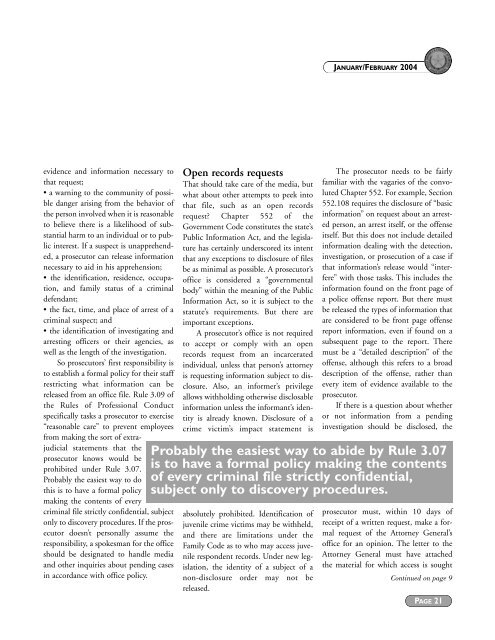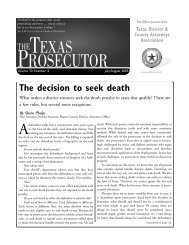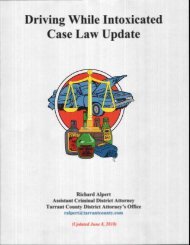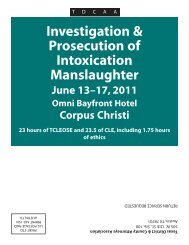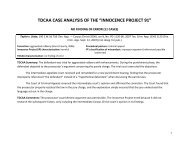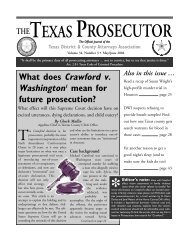Texas District & County Attorneys Association
Texas District & County Attorneys Association
Texas District & County Attorneys Association
Create successful ePaper yourself
Turn your PDF publications into a flip-book with our unique Google optimized e-Paper software.
JANUARY/FEBRUARY 2004evidence and information necessary tothat request;• a warning to the community of possibledanger arising from the behavior ofthe person involved when it is reasonableto believe there is a likelihood of substantialharm to an individual or to publicinterest. If a suspect is unapprehended,a prosecutor can release informationnecessary to aid in his apprehension;• the identification, residence, occupation,and family status of a criminaldefendant;• the fact, time, and place of arrest of acriminal suspect; and• the identification of investigating andarresting officers or their agencies, aswell as the length of the investigation.So prosecutors’ first responsibility isto establish a formal policy for their staffrestricting what information can bereleased from an office file. Rule 3.09 ofthe Rules of Professional Conductspecifically tasks a prosecutor to exercise“reasonable care” to prevent employeesfrom making the sort of extrajudicialstatements that theprosecutor knows would beprohibited under Rule 3.07.Probably the easiest way to dothis is to have a formal policymaking the contents of everycriminal file strictly confidential, subjectonly to discovery procedures. If the prosecutordoesn’t personally assume theresponsibility, a spokesman for the officeshould be designated to handle mediaand other inquiries about pending casesin accordance with office policy.Open records requestsThat should take care of the media, butwhat about other attempts to peek intothat file, such as an open recordsrequest? Chapter 552 of theGovernment Code constitutes the state’sPublic Information Act, and the legislaturehas certainly underscored its intentthat any exceptions to disclosure of filesbe as minimal as possible. A prosecutor’soffice is considered a “governmentalbody” within the meaning of the PublicInformation Act, so it is subject to thestatute’s requirements. But there areimportant exceptions.A prosecutor’s office is not requiredto accept or comply with an openrecords request from an incarceratedindividual, unless that person’s attorneyis requesting information subject to disclosure.Also, an informer’s privilegeallows withholding otherwise disclosableinformation unless the informant’s identityis already known. Disclosure of acrime victim’s impact statement isabsolutely prohibited. Identification ofjuvenile crime victims may be withheld,and there are limitations under theFamily Code as to who may access juvenilerespondent records. Under new legislation,the identity of a subject of anon-disclosure order may not bereleased.The prosecutor needs to be fairlyfamiliar with the vagaries of the convolutedChapter 552. For example, Section552.108 requires the disclosure of “basicinformation” on request about an arrestedperson, an arrest itself, or the offenseitself. But this does not include detailedinformation dealing with the detection,investigation, or prosecution of a case ifthat information’s release would “interfere”with those tasks. This includes theinformation found on the front page ofa police offense report. But there mustbe released the types of information thatare considered to be front page offensereport information, even if found on asubsequent page to the report. Theremust be a “detailed description” of theoffense, although this refers to a broaddescription of the offense, rather thanevery item of evidence available to theprosecutor.If there is a question about whetheror not information from a pendinginvestigation should be disclosed, theProbably the easiest way to abide by Rule 3.07is to have a formal policy making the contentsof every criminal file strictly confidential,subject only to discovery procedures.prosecutor must, within 10 days ofreceipt of a written request, make a formalrequest of the Attorney General’soffice for an opinion. The letter to theAttorney General must have attachedthe material for which access is soughtContinued on page 9PAGE 21


